Is this Trump crisis different?
When it comes to Trump and foreign policy, ours is a false sense of security
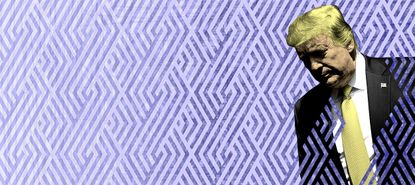

The Dow Jones Industrial Average tumbling almost 500 points hardly feels like much cause for concern anymore. After so much trade antagonism, it's difficult to get worked up about President Trump's tariff threats against China or the Chinese delegation threatening to pull out of negotiations. Haven't we done this before and stocks have only continued to rise?
Likewise, after so much foreign policy alarmism and belligerence, it seems hardly noteworthy that Secretary of State Mike Pompeo unexpectedly canceled a trip to Germany to saber rattle against Iran in Baghdad or the U.S. military rushed an aircraft carrier and B-52 bombers to the Persian Gulf. We survived Trump tweeting about the size of his nuclear button already; he wouldn't actually start a conflict with Iran, right?
But ours is a false sense of security. Taken together, this week's events are a worrying sign that the international community's fragile, patchwork mix of patience and limited engagement has exhausted its utility in containing the fallout of Trump's foreign policy.
Subscribe to The Week
Escape your echo chamber. Get the facts behind the news, plus analysis from multiple perspectives.

Sign up for The Week's Free Newsletters
From our morning news briefing to a weekly Good News Newsletter, get the best of The Week delivered directly to your inbox.
From our morning news briefing to a weekly Good News Newsletter, get the best of The Week delivered directly to your inbox.
When it comes to the trade war, most investors are probably gambling that Washington and Beijing will come to terms sooner rather than later, averting another round of tit-for-tat tariffs that harm both sides. Markets are also betting not just that a worsening trade war can be avoided, but also that existing tariffs will disappear. But what if they don't? It seems unlikely the Trump administration will win the far-ranging concessions on intellectual property, supply chain management, and imports that it is seeking from China. Will it really back down in the face of defeat?
President Trump's failure to bring his counterparts to heel is also on vivid display with Iran. Last month the Trump administration moved aggressively against Tehran by announcing it would no longer issue sanctions waivers to countries buying Iranian oil. The maneuver cut a bizarre spectacle — Iran was still observing the terms of the 2015 Joint Comprehensive Plan of Action, yet the Trump team was escalating the situation in the absence of any provocation whatsoever. Now, with Iran's announcement Wednesday that it would stop complying with elements of what is essentially a dead agreement, the U.S. has sent an aircraft carrier battle group to the Gulf.
It is actually shocking we didn't arrive at this perilous moment sooner. Think back to election night 2016, when markets tumbled as it became clear that Donald Trump, the reality TV star and right-wing Twitter provocateur, was going to become the president of the United States. Those fears were based on candidate Trump's campaign rhetoric about tearing up NAFTA, pulling out of the World Trade Organization, unleashing a trade war against China, destroying NATO, tearing up the Iran Deal, and more. Had President Trump pursued these policies in the way that he talked about them on the stump, he could have unleashed almost unimaginable and immediate economic mayhem.
But he hasn't. The Trump administration's foreign policy has been mostly a performative spectacle, an expression of the conservative id that has so far achieved little of lasting consequence. From the relocation of the U.S. Embassy in Israel to Jerusalem to the decertification of the Iran Deal, the president's rhetoric has either not matched its actual on-the-ground policies, or has not had any meaningful impact on existing problems. In most cases, the president has slaked some longstanding hard-right thirst for theatrical bullying without provoking the broader crisis that many feared. It has been quite the tightrope stroll.
There have been two primary groups protecting the world from President Trump's worst impulses. One is a turn-the-other-cheek attitude on the part of leaders determined to maintain the stability of the liberal international order in the face of Trump's sporadic efforts at revision. In fact, the cautious restraint shown by other countries in the face of the president's ugly provocations has been a key to the relative global stability of the past several years.
One important example is NAFTA itself, a longtime bête noire of the president going back to his days as a private citizen. The president has used language to describe Canada and Mexico that it is, shall we say, undiplomatic. Last year he called Canadian Prime Minister Justin Trudeau "dishonest and weak" and has constantly whined that Mexico is "killing us on jobs and trade."
Rather than respond in kind with vitriol and destabilizing countermeasures, Canadian Prime Minister Justin Trudeau and former Mexican President Enrique Peña Nieto played along with a very modest renegotiation of NAFTA, including the president's insistence on the idiotic new nomenclature of the "U.S.-Mexico-Canada Agreement" or USMCA. (It is worth noting that in Mexico and Canada the agreement has their own country listed first in the name). This strange new agreement has not been ratified by the legislatures of any of the three countries, and may not see the light of day until after the upcoming presidential elections. For the time being, NAFTA remains in effect precisely as it was the day that Trump was elected. The same goes for NATO, where Trump's bombastic rhetoric has mostly failed to convince allies to reach spending targets, and North Korea, where the regime continues to pursue a ballistic missile program.
Trump has also been hemmed in by his own advisors. Former Defense Secretary James Matthis recently confirmed that he sometimes simply ignored the president's orders. Former Secretary of State Rex Tillerson, former National Security Advisor H.R. McMaster, and other foreign policy hands managed to prevent the president from capricious or illegal policy decisions while they were in office. "We prevented a lot of bad things from happening," one senior official told The New Yorker. While some of these accounts might be self-serving, those days are over.
And therein lies the true danger today. For starters, the president has performed the kind of overhaul of his cabinet that typically only happens between a first and second term. Beltway foreign policy hands are out, replaced by likeminded ideologues such as Pompeo, or by "acting" secretaries whose tenure feels increasingly permanent. National Security Advisor John Bolton, a notorious warmonger, seems to be winning internal battles over the direction of U.S. foreign policy.
Compounding the problem of Trump's D.C. shackles getting loosened, many of the leaders who greeted President Trump's arrival in Washington are already gone or on their way out. Last year Mexico elected a left-wing populist, Andrés Manuel López Obrador, who has so far made peaceful relations with the Trump team a priority but who seems like a difficult long-term fit for Trump's style and policies. Canada is also set for a federal election this October, and opposition leader Andrew Scheer's Conservatives have led the ruling Liberals in the last nine public opinion polls. Scheer presents a challenging combination of ideas — he seems to share the president's disdain for the E.U. and willingness to restructure basic elements of the international order, but he has also become a critic of the new NAFTA deal.
In Iran, likewise, presidential elections in 2021 will bring new leadership to replace the term-limited Hassan Rouhani, whose relative moderation will be a difficult sell after the U.S. binned the Iran Deal and tightened the economic screws on Tehran. Many Iran observers think the country's hardliners are poised for a comeback, with reformists and moderates in disarray and at odds with one another. Rouhani may seek to mollify his critics with an escalation, or he may simply be overruled by unelected hardliners who hold the real power in Tehran.
In the end, four years may prove too long to wait for allies, competitors and adversaries to wait out the Trump administration's antics. The international system constructed after WWII features extraordinary durability, and decades of U.S.-led institution building have thus far succeeded in shielding the president from the consequences of his actions, to an extent far greater than many who greeted his election with alarm predicted. And while the administration may yet succeed in its efforts with China, or climb down from escalating tensions with Iran and Venezuela, the possibility of a dangerous crisis grows more significant by the day.
Create an account with the same email registered to your subscription to unlock access.
Sign up for Today's Best Articles in your inbox
A free daily email with the biggest news stories of the day – and the best features from TheWeek.com
David Faris is an associate professor of political science at Roosevelt University and the author of It's Time to Fight Dirty: How Democrats Can Build a Lasting Majority in American Politics. He is a frequent contributor to Informed Comment, and his work has appeared in the Chicago Sun-Times, The Christian Science Monitor, and Indy Week.
-
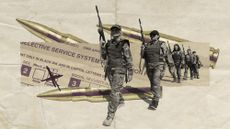 The issue of women and conscription
The issue of women and conscriptionUnder the radar Ukraine military adviser hints at widening draft to women, as other countries weigh defence options amid global insecurity
By Harriet Marsden, The Week UK Published
-
 Ukraine's unconventional approach to reconstruction
Ukraine's unconventional approach to reconstructionUnder the radar Digitally savvy nation uses popular app to file compensation claims, access funds and rebuild destroyed homes
By Harriet Marsden, The Week UK Published
-
 Will Ukraine's leadership reset work?
Will Ukraine's leadership reset work?Today's Big Question Zelenskyy hints at ousting of popular military chief, but risks backlash amid dwindling munitions, delayed funding and Russian bombardment
By Harriet Marsden, The Week UK Published
-
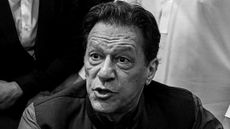 Imran Khan sentenced to 10 years: how powerful is Pakistan's military?
Imran Khan sentenced to 10 years: how powerful is Pakistan's military?Today's Big Question The country's armed forces ignore country's economic woes, control its institutions and, critics say, engineer election results
By Harriet Marsden, The Week UK Published
-
 What is Iran's endgame?
What is Iran's endgame?Today's Big Question Tehran seeks to supplant US and Saudi Arabia as dominant power in Middle East while forcing Israel to end Gaza war
By Harriet Marsden, The Week UK Published
-
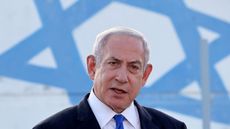 Israel proposes two-month pause in Gaza war in exchange for all Hamas hostages
Israel proposes two-month pause in Gaza war in exchange for all Hamas hostagesSpeed Read Deal doesn't include an agreement to end war, but might be 'the only path that could lead to a ceasefire', said US officials
By Harriet Marsden, The Week UK Published
-
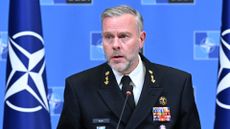 Nato official warns of all-out war with Russia in next 20 years
Nato official warns of all-out war with Russia in next 20 yearsSpeed Read Civilians must prepare for life-changing conflict and mass mobilisation, says military chief
By Harriet Marsden, The Week UK Published
-
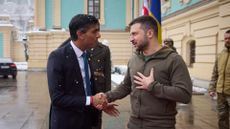 Rishi Sunak visits Kyiv to announce £2.5 billion in military support for Ukraine
Rishi Sunak visits Kyiv to announce £2.5 billion in military support for UkraineSpeed Read Surprise trip comes amid increased Russian bombardment and escalation of Middle East crisis
By Harriet Marsden, The Week UK Published


